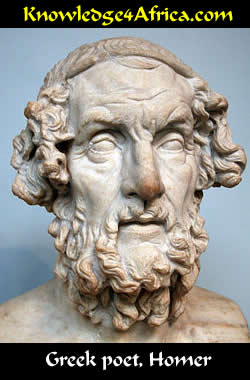|
READ THIS
A donkey strays onto the main highway and is struck by a car. Injured, he makes his way onto a small
holding where the narrator finds he has a serious decision to make.
 READ THE FOLLOWING PASSAGE:
READ THE FOLLOWING PASSAGE:
The stars were coming out, and the stars sing in their courses, or so it is said. Perhaps he was listening
to them.
Or was it some steadying pulse in his own veld-wise mind, something that assured him that he had
nothing more to fear?
I don't know. I only know that, however futile his existence, there was in the conjunction with our stars,
in his survival, and in my escape from remorse, a secret that negated futility.
And as I pondered this, I heard, with a shock of bewildered recognition, precisely the syllables with which
Achilles, according to Homer, greeted Ulysses when that wanderer penetrated Hades.
Perhaps you know those braying Greek syllables. I can't swear to it that the donkey didn't. At any rate,
it is a famous speech, or it was once, before the urge for useful knowledge ousted Greek from most of
our schools. It runs:
"Spare me your praise of death. Only let me live on earth . . . I would rather be a slave in the house
of a beggar than king of all the dead."
"Live then," I said to the donkey. "You aren't the first to have wandered blind about the world and see into
the hearts of men. Life is the least and most I can give you."
Have you looked at the questions
in the right column?
|
TEST YOURSELF!
Read the left column and then answer
the following questions:
"There was in the conjunction with our stars."
- What does the writer intend to say when he uses this expression? (4)

[Need help?]
The science of studying the influence of the stars on our lives is called ASTROLOGY.
Astrology claims that when the paths of stars cross (the conjunction of the two stars), that will have a
major influence on our lives.
In this case the stars that guided the donkey and those which guided the man who found him have
crossed, bringing the donkey and the man together.
|
Why, according to the narrator, are students no longer learning Greek at school? How does he feel about
this? (4)

[Need help?]
Modern education claims to teach learners useful information and claims that learning Greek is no longer
useful and must therefore be abandoned.
The author is clearly saddened by this, and believes that Greek still should hold a vital place in education.
|
Who are the following characters from Greek mytholody?
- Achilles? Homer? Ulysses? Hades? (8)

[Need help?]
Ulysses is a legend of Greek mythology, ruler of the island of Ithaca and one of the Greek generals during
the Trojan War.
Homer, a famous Greek poet, wrote a poem about his adventures, which he called the Odyssey. The
hero was Odysseus but the name was translated into Latin as Ulysses.
On his way home, Ulysses's ship was blown off course and he was thereupon subjected to a series of
bizarre adventures along the lines of the modern television series, Star Trek.
In the poem, Achilles was a Greek general who had been dipped by his mother in the River Styx to give
him immortality. A stray arrow hit Achilles on his heel and killed him.
Hades was the Greek word for the Underworld, the world where people go after death.
|
What is the author saying about blind people in the last paragraph? (2)

[Need help?]
Often blind people have peculiar insight into life; blind people sometimes are able to make wondrous
statements about life and people.
|
Is the narrator an educated man? Substantiate your answer. (4)

[Need help?]
Yes, indeed, the narrator is an educated man. He has a deep knowledge of Greek and the famous Greek
legends.
He also shows an astounding wisdom into the idea of life and death, of blindness and sight. His
conclusions are very philosophical.
|
Why does the author speak of "braying Greek syllables"? (4)

[Need help?]
For many people, Greek is an unintelligible language. "It's all Greek to me," means that one cannot
understand what is being said, it is so unintelligible.
It is as though the speakers are braying like donkeys instead of speaking a language.
|
The writer says, " . . . not the first".
- Who, mentioned in the story, had also been blind? (2)

[Need help?]
What about Oedipus?
He was a king from Greek mythology who was supposed to have fallen in love with his own mother.
Eventually Oedipus put out his own eyes, thereby making himself blind.
|
|



